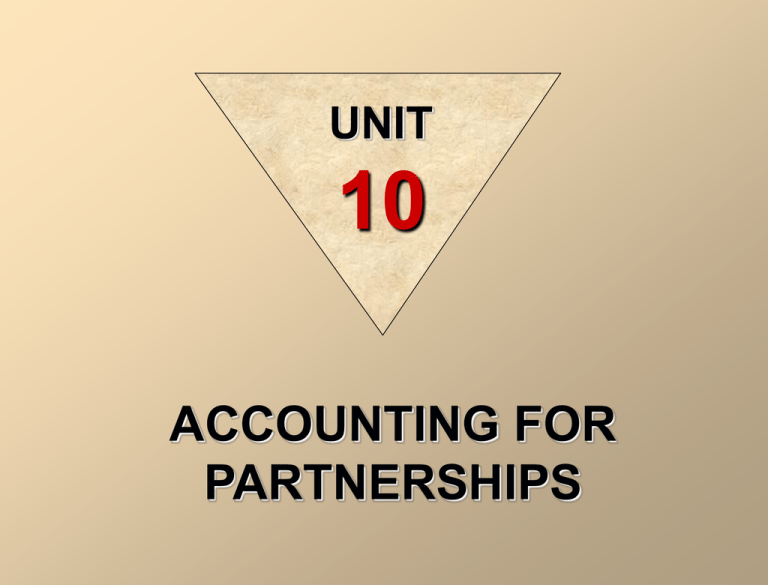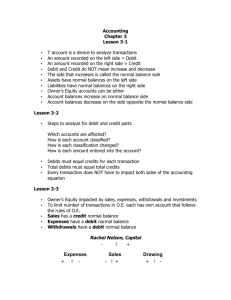Partnerships.
advertisement

UNIT 10 ACCOUNTING FOR PARTNERSHIPS ILLUSTRATION 10-1 PARTNERSHIP CHARACTERISTICS Association of Individuals Partnership Form of Business Organization Mutual Agency Unlimited Liability Co-ownership of Property Limited Life PARTNERSHIP CHARACTERISTICS Association of individuals. A partnership is a voluntary association of two or more individuals that may be based on as simple an act as a handshake or preferably a written agreement. Division of income. The net income (loss) of a partnership is divided among the partners according to their agreement. Mutual agency. Each partner acts on behalf of the partnership when engaging in partnership business. The act of any partner is binding on all other partners. Co-ownership of property. Partnership assets are owned jointly by all the partners. If the partnership is terminated, the assets do not legally return to the original contributor. Limited life. A partnership does not have unlimited life. A partnership is ended any time through the acceptance of a new partner into the firm or the withdrawal of a partner. Partnership dissolution occurs whenever there is a change in the makeup of the partners, regardless of the cause. Dissolution does not mean that the business ends. Operations can continue without interruption through the formation of a new partnership. Unlimited liability. Each partner is jointly and severally (individually) liable for all partnership liabilities. Creditors’ claims attach first to partnership assets and then to the personal resources of any partner, regardless of that partner’s equity in the partnership. Because each partner is responsible for all the debts of the partnership, each partner is said to have unlimited liability. ILLUSTRATION 10-2 ADVANTAGES AND DISADVANTAGES OF A PARTNERSHIP Advantages Combining skills and resources of two or more individuals Ease of formation Freedom from governmental regulations and restrictions Ease of decision making Disadvantages Mutual agency Limited life Unlimited liability Disagreements FORMING A PARTNERSHIP Each partner’s initial investment in a partnership should be recorded at the fair market value of the assets at the date of their transfer to the partnership. The values assigned must be agreed to by all of the partners. After the partnership has been formed, the accounting is similar to accounting for transactions of any other type of business organization. Upon the formation of a partnership, this personal computer should be recorded at its FMV of $2,500 instead of net book value. FORMING A PARTNERSHIP Example M. Gan and K. Sin start a partnership name Interactive Software with the following assets stated at their fair market value. Gan Sin Cash $8,000 $9,000 Office Equipment 4,000 Accumulated Amortization (2,000) Accounts Receivable 4,000 Allowance for Doubtful Accounts (1,000) Journal Entry Investment of Gan Jan 2 Cash Office Equipment M. Gan, Capital 8,000 4,000 Investment of Sin Jan 2 Cash 9,000 Accounts Receivable 4,000 Allowance for DA K. Sin, Capital 12,000 1,000 12,000 DIVIDING NET INCOME OR NET LOSS Partnership net income or net loss is shared equally unless the partnership contract specifically indicates otherwise. The same basis of division usually applies to both net income and net loss, and is called the income ratio or the profit and loss ratio. A partner’s share of net income or net loss is recognized in the accounts through closing entries. CLOSING ENTRIES Four closing entries are required for a partnership: 1. Debit each revenue account for its balance and credit Income Summary for total revenues. 2. Debit Income Summary for total expenses and credit each expense account for its balance. 3. Debit (credit) Income Summary for its balance and credit (debit) each partner’s capital account for his or her share of net income (net loss). 4. Debit each partner’s capital account for the balance in that partner's drawing account and credit each partner’s drawing account for the same amount. CLOSING ENTRIES Example On Dec 31, Interactive Software had sales of $100,000 and operating expenses of $68,000. The partners share profits and losses equally. Drawings for the year were Gan $8,000 and Sin $6,000. Dec 31 Dec 31 Dec 31 Dec 31 Sales Income Summary To close revenue 100,000 Income Summary Operating Expenses to close expenses 68,000 100,000 Income Summary (100,000-68,000) 32,000 M. Gan, Capital (32,000 x 50%) K. Sin, Capital (32,000 x 50%) to close net income to capital accounts M. Gan, Capital 8,000 K. Sin, Capital 6,000 M. Gan, Drawings K. Sin, Drawings To close drawings to capital accounts 68,000 16,000 16,000 8,000 6,000 INCOME RATIOS The partnership agreement should specify the basis for sharing net income or net loss. The following are typical of the ratios that may be used: 1. A fixed ratio, expressed as a proportion (2:1), a percentage (67% and 33%), or a fraction (2/3 and 1/3). 2. A ratio based on either capital balances at the beginning of the year or on average capital balances during the year. 3. Salaries to partners and the remainder in a fixed ratio. 4. Interest on partners’ capital balances and the remainder in a fixed ratio. 5. Salaries to partners, interest on partners’ capital balances, and the remainder in a fixed ratio. INCOME STATEMENT WITH DIVISION OF NET INCOME Example 1 Sara King and Ray Lee are partners in the Kingslee Company. The partnership agreement provides for 1) salary allowances of $8,400 for Sara and $6,000 for Ray, 2) interest allowances of 10% on capital balances at the beginning of the year, and 3) the remaining income to be split equally. Beginning Capital balances were King $28,000 and Lee $24,000. The division of the 2003 partnership income of $22,000 is as follows: King Total net income Based on salary allowance Based on interest allowance: King - ($28,000 X 10%) Lee - ($24,000 X 10%) Total Remaining income Remainder shared equally Division of net income $8,400 Lee Total $6,000 $22,000 (14,400) 2,800 2,400 (5,200) 1,200 1,200 $12,400 $ 9,600 (2,400) 2,400 0 $22,000 PARTNER’S CAPITAL STATEMENT KINGSLEE COMPANY Statement of Partners’ Capital For the Year Ended December 31, 2003 Capital, January 1 Add: Additional investment Net income Less: Drawings Capital, December 31 Sara King $ 28,000 2,000 12,400 42,400 7,000 $ 35,400 Ray Lee $ 24,000 9,600 33,600 5,000 $ 28,600 Total $52,000 2,000 22,000 76,000 12,000 $ 64,000 The equity statement for a partnership is called the statement of partners' capital. It’s function is to explain the changes 1) in each partner’s capital account and 2) in total partnership capital during the year. PARTNER’S EQUITY SECTION OF A PARTNERSHIP BALANCE SHEET KINGSLEE COMPANY The statement of Balance Sheet - partial partners’ equity December 31, 2003 is prepared from Total liabilities (assumed amount) $ 115,000 the income Partners’ equity Sara King, Capital $ 35,400 statement and the Ray Lee, Capital 28,600 partners’ capital Total partners’ equity 64,000 and drawings Total liabilities and partners’ equity $ 179,000 accounts. The balance sheet for a partnership is the same as for a proprietorship except in the equity section. The capital balances of the partners are shown in the balance sheet. INCOME STATEMENT WITH DIVISION OF NET INCOME Example 2 INCOME STATEMENT WITH DIVISION OF NET INCOME Example 2 cont. Net Income of $100,000 INCOME STATEMENT WITH DIVISION OF NET INCOME Example 2 cont. Net Income of $20,000


![Structural and electronic properties of GaN [001] nanowires by using](http://s3.studylib.net/store/data/007592263_2-097e6f635887ae5b303613d8f900ab21-300x300.png)